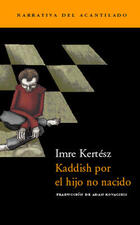If a child is the human objectification of the future, the one who has not been born is the painful confirmation of its absence. Collective history often takes the value of an example from the individual and his suffering. Thus, in this "Kaddish for the Unborn Child," Kertész makes a painful self-analysis, brutal, heartbreaking, and uncompromising, of "the traumatic event of Western civilization," which he himself suffered directly, and in which he establishes a connection between the long shadow cast by Auschwitz and the impossible of fatherhood. In this book, a man speaks of himself, but his confession catapults toward the collective.
Shopping cart
Loading cart
Important notices
|
|
Recordando a André Rouillé: Su legado en la fotografía André Rouillé 1948 - 2025 |
|
|
Libros de filosofía y co. Disponibles en Librería Herder |
|
|
Revista Filosofía & Co. nº 9 Nueva revista de filosofia divulgativa y actualidad |
|
|
"Espacios de la filosofía" - Mauricio Beuchot - Novedad Herder México |
|
|
Revista Filosofía & Co. nº 8 Nueva revista de filosofia divulgativa y actualidad |
Pay safely with:


In the webshop
New
|
|
Medios calientes 70159 $400.00 -0.00% $400.00 |
|
|
El bestiario de Michel Foucault 70404 $749.00 -15.00% $636.65 |
|
|
Regresar afuera 70148 $275.00 -0.00% $275.00 |
|
|
La instauración filosófica 70142 $570.00 -20.00% $456.00 |
|
|
La fuerza de los fuertes 70405 $519.00 -15.00% $441.15 |
In the press
Promotions
|
|
El Gobierno de las emociones 65449 $965.00 -60.00% $386.00 |
|
|
Prosa y poesía. Homenaje a Gonzalo Sobeja 70242 $1,755.00 -25.00% $1,316.25 |
|
|
Lingüística española aplicada a la terapia del lenguaje 70239 $300.00 -25.00% $225.00 |
|
|
Introducción a la filosofía 70243 $620.00 -25.00% $465.00 |
|
|
El tratamiento de los niños autistas 70240 $675.00 -25.00% $506.25 |











